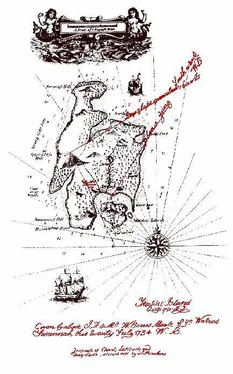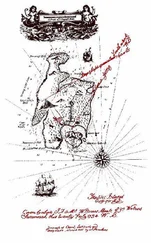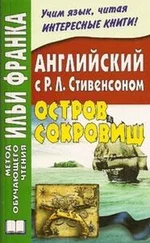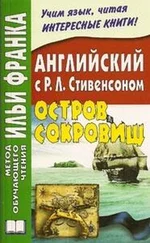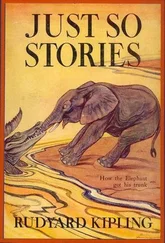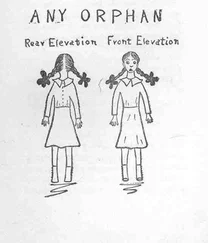Илья Франк - Английский язык с Р.Л. Стивенсоном. Остров сокровищ
Здесь есть возможность читать онлайн «Илья Франк - Английский язык с Р.Л. Стивенсоном. Остров сокровищ» — ознакомительный отрывок электронной книги совершенно бесплатно, а после прочтения отрывка купить полную версию. В некоторых случаях можно слушать аудио, скачать через торрент в формате fb2 и присутствует краткое содержание. Жанр: Языкознание, на русском языке. Описание произведения, (предисловие) а так же отзывы посетителей доступны на портале библиотеки ЛибКат.
- Название:Английский язык с Р.Л. Стивенсоном. Остров сокровищ
- Автор:
- Жанр:
- Год:неизвестен
- ISBN:нет данных
- Рейтинг книги:3 / 5. Голосов: 1
-
Избранное:Добавить в избранное
- Отзывы:
-
Ваша оценка:
- 60
- 1
- 2
- 3
- 4
- 5
Английский язык с Р.Л. Стивенсоном. Остров сокровищ: краткое содержание, описание и аннотация
Предлагаем к чтению аннотацию, описание, краткое содержание или предисловие (зависит от того, что написал сам автор книги «Английский язык с Р.Л. Стивенсоном. Остров сокровищ»). Если вы не нашли необходимую информацию о книге — напишите в комментариях, мы постараемся отыскать её.
Английский язык с Р.Л. Стивенсоном. Остров сокровищ — читать онлайн ознакомительный отрывок
Ниже представлен текст книги, разбитый по страницам. Система сохранения места последней прочитанной страницы, позволяет с удобством читать онлайн бесплатно книгу «Английский язык с Р.Л. Стивенсоном. Остров сокровищ», без необходимости каждый раз заново искать на чём Вы остановились. Поставьте закладку, и сможете в любой момент перейти на страницу, на которой закончили чтение.
Интервал:
Закладка:
2. 'Well (что ж),' said he, 'my mate Bill would be called the captain as like as not
(мой приятель Билл мог бы назваться = возможно, назвался капитаном, не
Мультиязыковой проект Ильи Франка www.franklang.ru
33
исключено). He has a cut on one cheek (у него порез = шрам на одной щеке),
and a mighty pleasant way with him (очень приятную манеру /поведения/),
particularly in drink (особенно в пьяном виде), has my mate, Bill (имеет мой
приятель, Билл). We'll put it, for argument like (мы примем это, за довод
вероятный = предположим; we'll = we will ), that your captain has a cut on one
cheek (что ваш капитан имеет шрам на одной щеке) — and we'll put it, if you
like (и, допустим, если хочешь), that the cheek's the right one (что щека
правая). Ah, well (ага, правильно)! I told you. Now, is my mate Bill in this here
house (итак, /скажи/, здесь ли мой приятель Билл, в этом вот /здесь/ доме)?'
3. I told him he was out walking (я сказал ему, что он пошел прогуляться; to be
out — не быть дома; to walk — идти, гулять ).
pleasant [pleznt] particularly [pq`tIkjulqlI] argument [`Rgjumqnt]
1. I told him I did not know his mate Bill; and this was for a person who
stayed in our house, whom we called the captain.
2. 'Well,' said he, 'my mate Bill would be called the captain as like as not. He
has a cut on one cheek, and a mighty pleasant way with him, particularly in
drink, has my mate, Bill. We'll put it, for argument like, that your captain has
a cut on one cheek — and we'll put it, if you like, that the cheek's the right
one. Ah, well! I told you. Now, is my mate Bill in this here house?'
3. I told him he was out walking.
1. 'Which way, sonny? Which way is he gone (каким путем = куда он ушел)?'
Мультиязыковой проект Ильи Франка www.franklang.ru
34
2. And when I had pointed out the rock (и когда я указал скалу) and told him how
the captain was likely to return (и сказал ему, каким образом = откуда капитан,
вероятно, мог вернуться), and how soon (и как скоро), and answered a few other
questions (ответил на несколько других вопросов), 'Ah,' said he, 'this'll be as
good as drink to my mate Bill (это /увидеть меня/ будет так же хорошо, как
выпивка для моего приятеля Билла; this'll = this will ).'
3. The expression of his face as he said these words (выражение его лица, когда
он произнес эти слова) was not at all pleasant (не было вовсе приятным), and I
had my own reasons for thinking (и я имел свои собственные основания
думать: «для думания») that the stranger was mistaken (что незнакомец
ошибался), even supposing he meant who he said (даже полагая, /что/ он имел в
виду /того/, о ком сказал). But it was no affair of mine, I thought (это было не
мое дело, я подумал); and, besides (и, кроме того), it was difficult to know what
to do (было трудно знать, что делать). The stranger kept hanging about just
inside the inn door (незнакомец продолжал стоять прямо внутри двери = в
дверях трактира; to keep hanging about — заставлять ждать /кого-то/ ),
peering round the corner like a cat waiting for a mouse (заглядывая за угол,
словно кот, поджидающий мышь; to peer — всматриваться ). Once I stepped
out myself into the road (один раз = только я вышел /было/ сам на дорогу), but
he immediately called me back (он тотчас же позвал меня обратно), and, as I did
no obey quick enough for his fancy (и, так как я не повиновался быстро
довольно его прихоти = зову), a most horrible change came over his tallowy face
(очень ужасная перемена =гнев исказил его сальное лицо; to come over —
овладеть, охватить ), and he ordered me in (он приказал мне /войти/ внутрь),
with an oath that made me jump (с ругательством, которое заставило меня
подпрыгнуть). As soon as I was back again (как только я вернулся снова) he
returned to his former manner (он вернулся к своей прежней манере
/говорить/), half fawning, half sneering (полульстивой, полунасмешливой; fawn
— молодой олень /до одного года/; /уст./ детеныш /зверя/; to fawn —
Мультиязыковой проект Ильи Франка www.franklang.ru
35
ласкаться; вилять хвостом /о животных, особ. о собаке/ ), patted me on the
shoulder (похлопал меня по плечу), told me I was a good boy (сказал мне, что я
славный мальчик), and he had taken quite a fancy to me (и /что/ он вполне
полюбил меня; to take a fancy to — привязаться /к кому-то/ ).
stranger [`streInGq] ordered [`Ldqd] fawning [`fLnIN] shoulder [`Squldq]
1. 'Which way, sonny? Which way is he gone?'
2. And when I had pointed out the rock and told him how the captain was
likely to return, and how soon, and answered a few other questions, 'Ah,' said
he, 'this'll be as good as drink to my mate Bill.'
3. The expression of his face as he said these words was not at all pleasant, and
I had my own reasons for thinking that the stranger was mistaken, even
supposing he meant who he said. But it was no affair of mine, I thought; and,
besides, it was difficult to know what to do. The stranger kept hanging about
just inside the inn door, peering round the corner like a cat waiting for a
mouse. Once I stepped out myself into the road, but he immediately called me
back, and, as I did no obey quick enough for his fancy, a most horrible change
came over his tallowy face, and he ordered me in, with an oath that made me
jump. As soon as I was back again he returned to his former manner, half
fawning, half sneering, patted me on the shoulder, told me I was a good boy,
and he had taken quite a fancy to me.
Читать дальшеИнтервал:
Закладка:
Похожие книги на «Английский язык с Р.Л. Стивенсоном. Остров сокровищ»
Представляем Вашему вниманию похожие книги на «Английский язык с Р.Л. Стивенсоном. Остров сокровищ» списком для выбора. Мы отобрали схожую по названию и смыслу литературу в надежде предоставить читателям больше вариантов отыскать новые, интересные, ещё непрочитанные произведения.
Обсуждение, отзывы о книге «Английский язык с Р.Л. Стивенсоном. Остров сокровищ» и просто собственные мнения читателей. Оставьте ваши комментарии, напишите, что Вы думаете о произведении, его смысле или главных героях. Укажите что конкретно понравилось, а что нет, и почему Вы так считаете.
